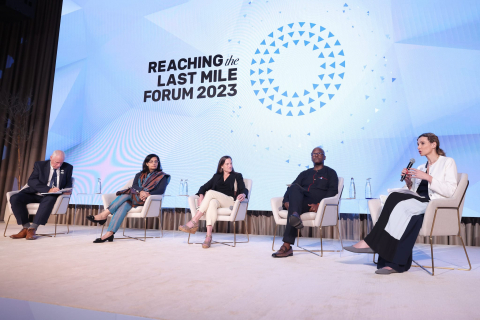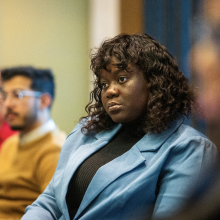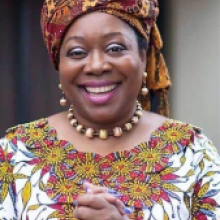
As world leaders converged in Dubai for COP28, the urgency to address climate change resonated across the globe. Amongst the myriad of challenges exacerbated by climate change, one often overlooked consequence is its impact on global health.
To kickstart the week, the World Health Organisation launched the World Malaria Report 2023 , which revealed that global malaria cases rose by five million in 2022, reaching 249 million (compared to 2021), with an estimated 608,000 malaria deaths in 2022 compared to 576,000 in 2019. These figures are stark and gave us a renewed sense of urgency going into the conference.
On social media the RBM Partnership, unveiled a compelling animation created by Malaria No More UK, aiming to bridge the gap in understanding the intricate connection between climate change and the prevalence of malaria.
and various partners launched campaigns highlighting the sense of urgency including the Face for Change, Change the Story and #UniteTheFight campaigns
At COP28 RBM's CEO Dr Michael Adekundle Charles had the chance to attend many panels including the following:
- The Reaching the Last Mile Forum, where I was able to bring the voice of people in communities that I have met to show why it is important to break down silos between disease areas
- The WHO Pavilion event here, attended by Her Excellency the Honourable Minister of Health of Malawi, where we had rich discussions at the "Human Face of Climate Change", delving into the World Malaria Report and how we will finance the fight around Malaria and Climate Change,
- The UNOPS stage event - where we discussed, again, how communities and civil society can and should be included in this fight. The panel featured RBM Partnership's Advocacy Co-Chair and Civil Society representative, Olivia Ngou, Aloyce Urassa from ALMA's Youth Council, Harpreet Bagga, Managing Director of social behaviour change agency Purpose, and Whitney MWangi, Health Policy and Advocacy
Participating in COP28 was an enriching experience, filled with engaging discussions, reunions with old friends and colleagues, and collaborative problem-solving. The RBM Partnership played a crucial role in spotlighting the interconnected challenges of climate change and malaria, breaking down silos on the global stage following the release of the World Malaria Report.

Key Takeaways:
Our Communities Matter: We need to continue sharing stories from impacted communities, reinforcing the collaborative ethos of the malaria community. Strengthening health systems emerged as a critical strategy to create a safer world for all.
Disproportionate Impact on Women: The intersection of the climate crisis and gender inequality became evident at COP28. Organizations like UNICEF and UNFPA highlight the need to place women and girls at the centre of climate adaptation responses. The devastating effects on vulnerable communities, particularly in African countries, underscored the urgency to keep climate and health high on the agenda.
Placing children's stories at the Forefront: Zero Malaria’s Change the Story campaign placed stories from children in malaria-endemic countries, including Mozambique and Pakistan, at its core. Children, the most vulnerable human beings in the fight against malaria, bear the brunt of the changing weather patterns that intensify the disease's impact. Despite being the most affected, their voices are often marginalized. The campaign strives to rectify this by urging world leaders to listen to the voices of children and make decisions that will reshape the narrative for millions of children globally, ensuring a future free from the threat of malaria
Financing and Access: A landmark moment occurred at COP28 when $1 billion was committed to climate and health, with 123 countries signing the Health Declaration. While monumental, the focus now shifts to improving the efficiency and effectiveness of finance flows. Understanding mechanisms like the Green Climate Fund is crucial, ensuring that health and climate remain integral to fund allocation discussions.
The commitment witnessed at COP28, including the significant contributions from the World Bank and its partners (WHO, GAVI, Global Fund, and Foundations), is commendable. The Climate and Health Program's initiative to co-convene a Development Bank Working Group for Climate-Health Finance signals a step towards addressing immediate challenges.
As we reflect on COP28, the call to action is clear: unite, implement, and deliver. The $1 billion commitment to Climate and Health, as well as $777m earmarked for Neglected-Tropical Diseases, is a promising start,. The focus now shifts to ensuring communities can access these funds effectively. The journey continues beyond the week, next month, next year as we collectively strive to protect our communities and build a resilient future in the face of climate change.

Latest Blogs



